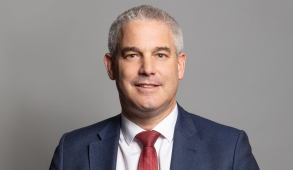Questions raised over funding for reconfirmed building programme
In a statement to the Commons, health and social care secretary Steve Barclay (pictured) re-confirmed the government’s commitment to build 40 new hospitals by 2030. He added five hospitals to the programme that were originally built with reinforced autoclaved aerated concrete (RAAC), which need to replaced urgently before 2030 – joining two RAAC hospitals that were already on the programme. And three mental health hospitals are also being delivered. But as part of this ‘reprioritisation’, up to eight of the originally identified will now be completed after the original 2030 deadline.
Two of the 40 hospitals are already open to patients – the Northern Centre for Cancer Care and the Royal Liverpool Hospital – while five are under construction.
The seven RAAC hospitals will be completely rebuilt using a standardised design known as Hospital 2.0. And this standard design will also be used in a number of other builds including some in cohorts 2 and 3 of the programme.
Mr Barclay said the current programme was ‘expected to represent more than £20bn of new investment in hospital infrastructure’. ‘Going forward, new schemes will be considered through a rolling programme of capital investment in hospital infrastructure to secure the building of new hospitals beyond 2030,’ he said. ‘It will mean further future investment to upgrade NHS facilities across the country, with details to be agreed periodically to provide greater future certainty, and will allow more than 40 new hospitals to be built in the longer term.’
In 2020, the government confirmed an initial allocation of £3.7bn to support the programme up to 2024/25. And Mr Barclay has now committed to fully funding hospitals within the programme. However, this will require actual funding to be set out in future spending reviews. With NHS capital budgets typically around £8bn, including operational capital and funding for national programmes, the programme suggests there will be significant capital increases in the years up to 2030.
All schemes will also still be following a business case process, which will include being reviewed and agreed by ministers. Final individual allocations for schemes will only be determined once the full business cases have been agreed.
Julian Hartley, chief executive of NHS Providers, said the trusts in the NHP would welcome the long-awaited clarity on future funding and the green light to start work on projects.
But while today’s confirmation of the funding is welcome, some trusts already on the programme will be deeply disappointed their construction plans will not be delivered before 2030,’ he said. And he added that there were wide ranging capital needs in the NHS that extended well beyond the NHP.
‘The fact that 100 trusts bid for the last eight NHP places shows that we need a step change in capital investment by the government,’ Sir Julian added. ‘Trusts that missed out still need major capital investment to overhaul ageing estates.’
And he called for more detail to ‘work out whether the extra funding is enough to meet trusts’ commitments to their communities and patients’ expectations’, particularly given that the costs of delayed NHP schemes had spiralled due to inflation.
Matthew Taylor chief executive at the NHS Confederation said the £20bn of investment fell significantly short of the £35bn it is expected to cost. ‘This investment is welcome, but we are in this situation because the NHS has been allowed to get into such a significant state of disrepair over the last 15 years where its maintenance backlog in England now exceeds £10bn,’ he said. He called for a ‘comprehensive and long-term capital investment plan’ that also covered primary care.
Related content
The Institute’s annual costing conference provides the NHS with the latest developments and guidance in NHS costing.
The value masterclass shares examples of organisations and systems that have pursued a value-driven approach and the results they have achieved.